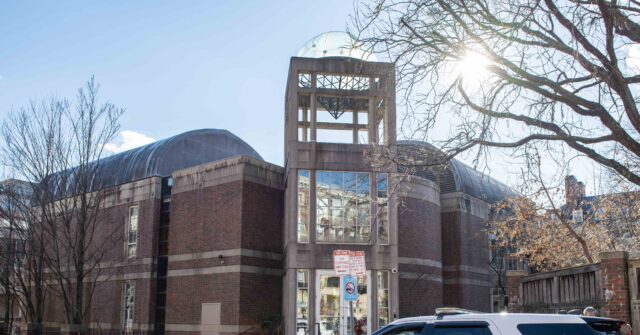On Monday night, a protest with clearly antisemitic overtones took place outside the Hillel building at Harvard University, coinciding with a lecture featuring a former spokesman for the Israel Defense Forces (IDF). Protesters chanted slogans such as “Zionists are not welcome here!” and “From the river to the sea/Palestine will be free,” which is widely understood as a call for the elimination of the state of Israel. The term “Zionist” in this context refers broadly to supporters of Israel’s right to exist, a belief held by over 90% of Jewish individuals. Therefore, the exclusion of “Zionists” implicitly suggests that Jews themselves are unwelcome in the protest’s view.
The protest messages were underscored by banners stating, “Hillel Hosts War Criminals” and “IOF Out of Campus Out of Gaza,” denouncing Israel’s military actions and addressing the IDF as the “Israeli Occupation Forces.” Amongst the chants were phrases like “Shame on Hillel,” “From the River to the Sea,” and allegations labeling Israel as a terrorist state. These sentiments were not only aimed at the event but reflected a broader anti-Israel sentiment that has surfaced on campuses across the U.S., particularly in response to ongoing conflicts in the region. The Executive Director of Harvard Hillel, Jason B. Rubenstein, issued a statement reaffirming the importance of Harvard Hillel as a space for Zionism and Jewish life, condemning the protests as a form of bigotry against Jewish students.
Rubenstein articulated that Zionism—defined as the pursuit of Jewish self-determination in Israel—is a fundamental aspect of the religious identity shared by many Jewish affiliates at Harvard. He voiced his concerns that the exclusionary rhetoric aimed at Zionists effectively marginalizes a significant portion of the Jewish community. Rubenstein made an appeal for understandings across different views regarding Israel, urging that the discriminatory demands of the protesters should be recognized as bigotry, rather than legitimate political discourse.
While the Hillel building is not technically situated on Harvard’s main campus, it serves as a crucial hub for Jewish students, hosting various religious congregations and providing kosher meal options. The significance of Hillel as a religious and community space highlights the unsettling atmosphere generated by such protests, which can deter the participation and expression of Jewish identity among students. This incident serves as a stark illustration of the ongoing tensions surrounding campus discourse about Israel and illustrates how protests can spill over into broader cultural and religious contexts, potentially alienating members of the community.
The protest was organized by a collective known as Harvard Jews for Palestine, which was not a recognized student group until the previous year. This reflects a broader trend at Harvard where previously radical groups have increasingly mobilized unrecognized factions for activism in response to university scrutiny and potential disciplinary action. The Palestine Solidarity Committee, associated with the protests, faced suspension last April but had its status reinstated in September, which could indicate a shift in institutional policy regarding such activism.
The emergence of protests like this one underscores the painful reality of rising antisemitism on college campuses, especially in light of recent events linked to Israel. Harvard’s leadership has faced intense scrutiny and backlash; the former university president, Claudine Gay, resigned amidst accusations of mismanagement during this increasingly fraught situation. The ongoing discourse surrounding Israel and Palestine continues to polarize communities, raising vital questions about free speech, diversity, and the responsibilities of educational institutions to protect all students while fostering open dialogue on contentious issues.

